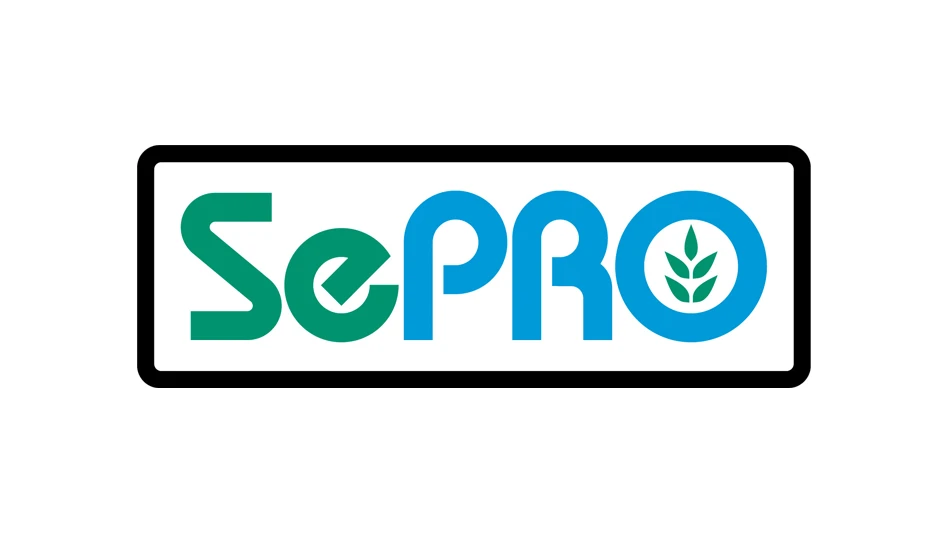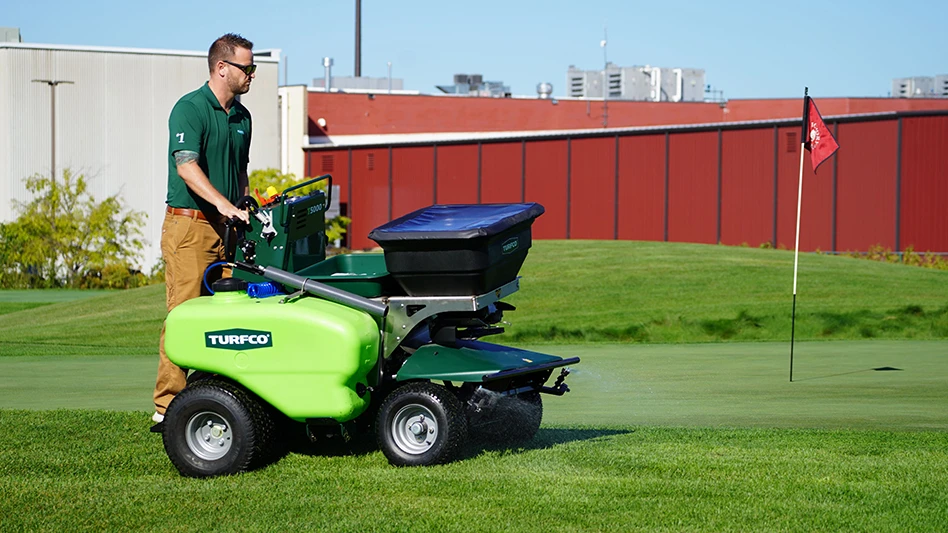Many companies – including hotels, airlines and even banks – have them. Points. Companies want consumer loyalty, and they try to earn that by rewarding them with points when purchasing goods or services. Chemical companies are no different. They want the loyalty of golf course superintendents.
But because maintaining golf courses is a business, the purchasing habits are different than an average consumer trying to rack up points to fly to a warm destination in the dead of winter. For the superintendents, it’s all about the product. For the suppliers, it’s about saying “thank you” for their business.
Syngenta Professional Products and Bayer Environmental Science have similar programs that probably are the most well-known in the industry. Although not a points-based program, BASF’s early-order program is well known, too.
The programs
GreenPartners has been around for eight years in one form or another and has been called GreenPartners since Syngenta was formed in late 2000. A strong majority of Syngenta customers take part in the program, says Joe DiPaola, Ph.D., golf market manager for Syngenta. Even though superintendents say they buy Syngenta products because of their effectiveness, not because of a loyalty program, DiPaola says the GreenPartners program is a simple “thank you” to them. The GreenPartners program also is an extension of Syngenta’s brand and helps remind customers of the company, says Margaret McLean, senior marketing communications manager, Lawn & Garden for Syngenta.
Superintendents can redeem points for a variety of items including turf equipment, education, training videos, airline tickets to a conference and agronomic tools. They also can donate points to associations and universities. But not one product or area is redeemed much more than others, says Norman Barclift, loyalty marketing manager for Syngenta.
Throughout the years, the number of “goodies” such as caps and jackets that were rewarded has decreased substantially, DiPaola says.
“While those were done to increase brand awareness, the program today is focused more on business tools and giving superintendents the ability to reward their crews,” he says.
GreenPartners also features a Uniquely Yours program in which superintendents can redeem points for something that’s not typically available through the program. They can work with Syngenta to customize something for their operation.
“The points belong to the course, and we want to make sure these items are applicable to the business,” McLean says.
At Bayer Environmental Science, the intent of the company’s Accolades program is to reward the best, most loyal customers with additional incentives, says Jason Kuhlemeier, marketing services and project manager for Bayer. Superintendents can redeem points for things such as educational opportunities, training materials, equipment and tools like digital cameras. The best Accolades customers can ask for things they need that aren’t available on the Accolades Web site.
“Some customers manage Accolades points more intensely than others,” Kuhlemeier says. “Some superintendents may hold on to their points for a while to purchase things like a (John Deere) Gator. But the program isn’t exclusive to one supplier.”
Accolades points don’t equate to a dollar amount. For example, one 30-pound bag of Merit equals 50 points.
For the most part, the program is the same as it was in 2003. However, in mid-2004, Bayer implemented a paperless points system for the program so users could track their points electronically, eliminating the need to make copies of their invoices and submit them to Bayer – although some still prefer to do it that way.
Throughout the years, the program has been successful, and the number of participants has grown each year, Kuhlemeier says.
“There aren’t any significant changes on the horizon, but we will continue to look for ways to enhance the program ,” he says.
BASF’s early-order program has been around for four years and was first called CrewPack because the company wanted to focus on rewarding not only the superintendent, but his crew as well. Rewards that were part of the CrewPack included gloves, jackets and turf-stress identification glasses.
“At the least, we wanted to give something to superintendents that would help them out, such as the turf-stress disease glasses,” says Bob York, marketing associate for BASF Professional Turf & Ornamentals. “TVs, computers and things like that were never part of the program.”
Now the program is called ProPack.
“We don’t do give-a-ways anymore,” says York. “We established a turf council that consists of superintendents and asked them what they wanted in an early-order program. They wanted products at a good price, and they didn’t want us to change the price of products during the year. BASF changed its program recently.
“We are not as big as the other guys, so we need to do things smarter or better,” York says. “Distributors are important to us, so if a superintendent orders so much, they get a rebate that goes to their account with the distributor. They can use that to buy other products, even those that aren’t BASF brands. Superintendents don’t want to be told what to buy. They say it’s an easy program.”
As part of the program, superintendents need to buy any BASF-branded fungicide, herbicide or insecticide (which can be a single product or any combination) before Dec. 15 to earn credit with their turf supplier to save on future purchases on anything they sell. If they buy a minimum dollar amount ($5,000 to $9,999), they’ll receive a 3-percent credit. The company doesn’t offer anything below $5,000. If they spend between $10,000 and $14,999, they receive a 4-percent credit; between $15,000 and $19,999, a 5-percent credit; and $20,000 or more, a 6-percent credit.
The number of superintendents participating in the program has doubled every year for the past three years, York says. He declined to say exactly how many superintendents are part of the program or what that percentage is related to all of the company’s superintendent customers.
BASF evaluated the program in February to see how well it worked last year. It will make tweaks to the program based on the assessment.
“A lot of decisions are based on the turf council,” York says. “We want it to be easy for superintendents to follow and use the program.”
Some superintendents enjoy having the Dec. 15 deadline because they know what core products they’ll use the next year, York says.
Lack of value
Yet, with all the possibilities reward programs offer, some superintendents are ambivalent about them because they’re more focused on budgets and the need for particular products.
Bruce Worzella, CGCS, at West Bend (Wis.) Country Club, spent $53,500 on pesticides last year. He earns points from Bayer’s and Syngenta’s programs and turns them over to purchase GCSAA merchandise. He bought a TV for the shop so the staff can watch the Superintendents’ Videomagazine, as well as a digital camera and GCSAA books with reward points.
All the points he earns are turned back into the facility. He says his distributors do a good job of keeping track of the points he earns. Despite his involvement with the programs, Worzella would prefer a price discount.
“They should just lower the price of pesticides,” he says. “If companies would be more competitive in price with generics, then we would benefit more from that.”
Like Worzella, Scott Schraer, CGCS, at Scioto Reserve Golf & Athletic Club in Powell, Ohio, buys products early in the beginning of November and December from Syngenta and Bayer, earning reward points.
“I used points once a while back to buy pesticides, but points don’t mean much,” Schraer says. “I want the savings or a discount on the cost of the pesticides.”
But DiPaola says lowering the price instead of earning rewards is like comparing apples and oranges, like comparing a capital expenditure budget with a maintenance budget.
Worzella’s fiscal year is from Nov. 1 to Oct. 31, so most of his ordering is done for the following year in November or December. Because of that time frame, he can take advantage of discounts and can hold off paying distributors until May. Worzella, who has a maintenance budget of $677,000 including labor, hasn’t used reward points to purchase more pesticides, and he never uses all his points by year’s end.
“I don’t spend them just because they’re there,” he says, adding that he’s been part of frequency programs for about five years. “I look at the amount of time and money Syngenta or Bayer invests in bringing a product to market. I have loyalty to the companies who spend the money in the long term. I know superintendents who have a different view of that, but I can lean a little more on the company if there’s a problem down the road.
“I look at the best price for the best product,” he adds. “These programs are insignificant. It’s just something to make you aware of the products. If they didn’t have the loyalty programs, I’d still buy from them.”
Schraer says he doesn’t use points regularly because he doesn’t spend the time keeping track of them because he has other priorities.
“For me and my club it boils down to price,” he says. “I have a stringent budget. But I’m not saying any one product is better than another. I’m not going to buy a product because of points. It comes down to cost and service from the sales reps. I give my business to as many people as possible, not just agency products.
“Points aren’t an incentive,” he adds. “Products sell because they work, not because you can get a weed eater. I’m not going to let points dictate how I buy products.”
Dave Phipps, golf course superintendent at the 18-hole Stone Creek Golf Course in Oregon City, Ore., purchases branded and some generic pesticides from many suppliers. He might be part of Syngenta’s GreenPartners program, but he’s not sure because that’s something one of his distributors would have signed him up for.
“The frequency or points programs don’t have an impact on what I buy or who I buy from,” he says.
Of all the rewards items Phipps has heard about – everything from tools to computers – he could justify some things but would have difficulty accepting a gift that would benefit himself personally. However, he wouldn’t have a problem with items that would be considered giving back to the industry.
“It’s the club’s money, so if anybody should benefit, it should be the club,” he says. “I hope people have a conscience when they spend their points.”
Some public golf courses have strict guidelines because employees are on the public payroll. But Phipps, whose maintenance budget is $619,000, is on a private payroll because he works for a management company, Total Golf Management Services, which operates the municipal course.
Another reason a frequency program isn’t that important to Phipps is his location, the Pacific Northwest, where disease pressure is lower than other parts of the country.
“We don’t use a lot of insecticides and fungicides,” he says. “For example, I’ve never seen fusarium patch. We have bentgrass greens that I spray two or three times a year. At most, some guys are spraying their bentgrass greens once a month. We don’t stand to gain much from the frequency programs.”
Refuting superintendents who say the programs aren’t valuable, DiPaola cites the number of superintendents in the GreenPartners program and their purchasing behavior.
“There are a significant number of people taking advantage of the program,” he says.
And despite superintendents saying they don’t perceive value in rewards programs, Schraer says he gets it.
“If you’re at a club where you can buy tools you normally won’t buy, then it’s valuable,” he says. “It’s an option to purchase something you normally wouldn’t buy.” GCI

Explore the March 2007 Issue
Check out more from this issue and find your next story to read.
Latest from Golf Course Industry
- Atlanta Athletic Club approves funding for master plan
- Maximizing Cultural Practices and Agronomic Benefits with Minimal Surface Disruption
- Real Answers about Spray Nozzle Choices
- From the Course to the Factory: How Customer Insights Drive Innovation
- New & Proven Enzyme Strategies for Sprayable Thatch Management
- Innovating Tomorrow: Wittek’s New Products & Industry Staples
- PBI-Gordon introduces new field development team
- The Cabot Collection announces move into course management






